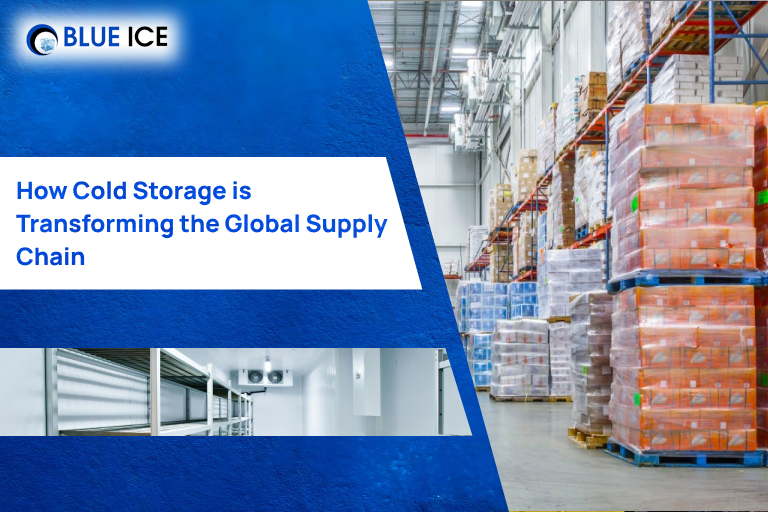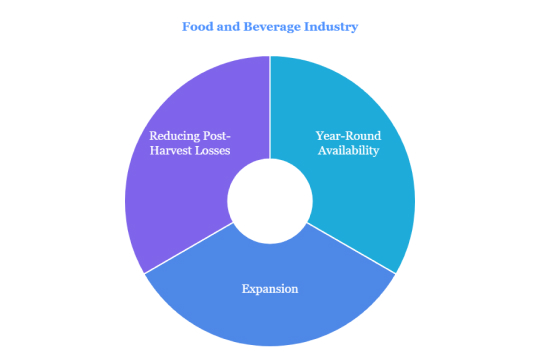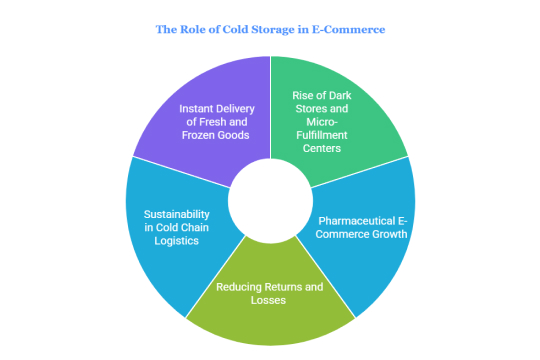
How Cold Storage is Transforming the Global Supply Chain
Demand for cold storage solutions is quietly changing the world supply chain. Perishable goods preservation at controlled temperatures has become a core capability of modern logistics.
With a growing world population and consumer preference for fresh and frozen products cold storage facilities have never been more important.
In this article, we'll see how cold storage is redefining industries, the challenges it brings and why companies like Blue Ice India are at the forefront of this change.
How Cold Storage is Revolutionizing Industries
Cold storage is no longer a supplementary service. With growing globalisation, changing customer tastes and strict quality requirements, businesses worldwide depend on cold store facilities to keep product integrity, reduce waste and also optimize distribution. Below are the industries which were changed by cold store solutions.

1. Food and Beverage Industry
The food & beverage sector is the biggest user of cold storage warehouses. Temperature control ensures product safety and also prevents bacterial growth from preserving fresh farm produce to frozen ready-to-eat meals.
-
Reducing Post-Harvest Losses:Every year, nearly one-third of food production globally is wasted because of poor food storage and logistics (FAOM Report).
Cold storage warehouse prevents spoilage of perishable items such as fruit, veggies, meat and dairy.
-
Year-Round Availability: Seasonal produce like berries or citrus fruits can now be stored and delivered year-round to meet consumer demand minimizing price fluctuations.
Expansion: The frozen foods market is set to reach USD 404.8 billion by 2027 Driven by convenience food demand (Mordor Intelligence).
The efficiency of cold storage companies makes sure these products maintain their taste, texture and nutrition.
Find out how cold storage can help maintain the quality and safety of temp-sensitive products like ice cream! Learn more about Cold Storage in Ice Cream Making here.
2. Pharmaceuticals
Cold store facilities are utilized extensively by The pharmaceutical industry to keep temperature-sensitive medications, vaccines & biologics.
-
Cold Chain Logistics Growth: The global cold store logistics market for pharmaceuticals is projected to grow at a CAGR of 7.5% from 2022 to 2030, driven by the rise of biologic drugs and personalized medicine (IMARC Group).
-
Vaccine Distribution: COVID-19 illustrated the significance of cold store warehouses for cold vaccines that must travel at very low temperatures. Without a great cold storage facility big immunization programmes would have been impossible.
-
Specialized Storage for Biologics: Advanced biologic treatments/gene therapies require very particular Storage conditions - often close to -80°C, - that spotlight cold Store business's importance for pharmaceutical logistics.
3. Floriculture and Horticulture
Flowers, decorative plants and nursery stock are perishable and need exact humidity and temperature control during transportation to keep them fresh.
-
Global Trade in Flowers: Countries like the Netherlands, Ethiopia and Kenya export enormous amounts of dollars of Flowers annually. They rely on cold store warehouses so flowers reach customers in good condition.
-
Horticulture Products: Apart from flowers, refrigerated storage is vital for potted plants, saplings and bulbs to guarantee viability over long distances.
4. Seafood Industry
The demand for frozen and fresh fish has increased rapidly over the years since fish and shellfish go bad rapidly without temperature control.
-
Frozen Seafood Trade: Countries such as Norway, Japan along Chile export massive quantities of seafood that require cold store warehouses with blow-freezing abilities to help keep it fresh during shipping.
-
Ensuring Food Safety: Seafood must be stored and transported below -18°C to stay away from bacterial contamination. Cold storage companies are crucial to ensuring compliance with this standard.
5. Dairy Industry
Dairy like milk, cheese, butter and yoghurt require refrigeration to avoid spoilage.
-
Milk Storage and Distribution: The global dairy market is anticipated to be worth USD 587 billion with cold chain logistics supporting timely Distribution (Research & Markets). Cold store facilities keep things fresh from farm to retailer.
-
Ageing of Cheese: Manyu cheese varieties need controlled temperature and humidity for ageing, therefore a cold storage warehouse is necessary for the dairy industry.
-
Supply Chain Efficiency: Proper refrigeration keeps dairy products fresh across long supply chains decreasing spoilage/financial losses for producers.
6. Meat and Poultry Industry
The Meat food Industry is one of the most temperature-sensitive sectors & refrigeration/freezing standards must be observed to avoid spoilage & microbe growth.
-
Preventing Contamination: Meat products should stay at below4°C under refrigeration and also below -18°C under freezing. Cold store facilities ensure food safety guidelines are observed.
-
Global Meat Trade: Annually, countries such as India, the U.S. Brazil and Australia export billions of dollars of beef, chicken and pork through cold warehouses for storage during transit.
-
Ageing and Processing: Premium meat cuts may require dry ageing at a controlled temperature to enhance tenderness and flavour and advanced refrigeration solutions enable this.
Why Cold Storage is Crucial for E-Commerce Success

-
1. Instant Delivery of Fresh and Frozen Goods
Now consumers want fresh food, dairy, frozen meats and prepared meals delivered the same day or the next day.
Without cold store warehouses, this temperature could not be maintained throughout the supply chain.
Those demands have forced companies like Amazon Fresh and BlinkitGrocery to expand their cold storage facility networks.
-
2. Rise of Dark Stores and Micro-Fulfillment Centers
E-commerce-driven grocery models like "dark stores" (retail spaces for online orders) and micro-fulfilment centres rely on cold storage companies to keep perishable items cold before consumers.
These facilities are placed in cities to reduce delivery time and guarantee quality products.
-
3. Sustainability in Cold Chain Logistics
E-commerce is increasingly being pressed to adopt sustainable logistics practices.
Green packaging, electric refrigerated vehicles and energy-efficient cold store warehouses are innovations that reduce the environmental impact of temperature-sensitive deliveries.
-
4. Pharmaceutical E-Commerce Growth
Cold store facilities have also been demanded due to online pharmaceutical sales.
Some medications, like insulin and speciality drugs, require precise temperature management.
Top cold storage companies developed pharmaceutical storage solutions for this expanding market.
-
5. Reducing Returns and Losses
The return handling issue is among the biggest challenges for e-commerce especially for perishable products.
Cold store warehouses limit losses as they pack food and pharmaceuticals safely and securely.
Want to own your cold storage facility and capitalize on this growing market? Learn more about starting a multi-component Cold Storage business and important strategic considerations at "How to Start a Multi Commodity Cold Storage Business”.
Final Thoughts
Cold store facilities help preserve food or store life-saving pharmaceuticals so products can reach consumers in perfect condition without causing waste or increasing supply chain efficiency.
And with growing global demand comes more innovative refrigeration technology that will change how industries store and distribute temperature-sensitive goods.
Blue Ice India provides cold storage services with high-performance cold storage to businesses from various industries.
Whatever your requirement for refrigeration of food, pharmaceuticals or industrial goods Blue Ice India provides tailor-made solutions.
Connect with us to optimize your supply chain and guarantee product integrity at all stages.
Frequently Asked Questions
It is a temperature-controlled facility where perishable goods such as foodstuffs, pharmaceuticals, and chemicals are kept to avoid spoilage and maintain quality.
Cold storage allows the transportation of perishable goods across international boundaries, ensuring international safety standards are met while minimizing the loss of product.
Keeps perishables fresh and safe, extending shelf life, reduces food waste, and keeps refrigerated and fresh food in demand.
